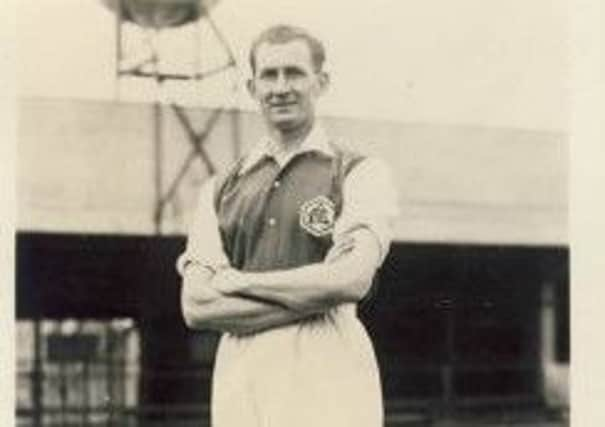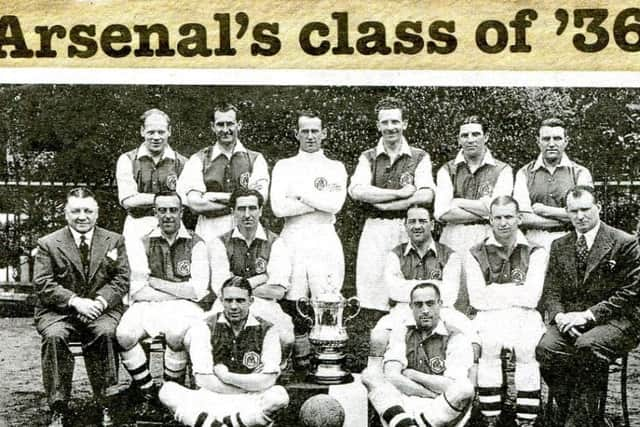Lancaster nostalgia: Jack Crayston


A right-half he played in the North Lancs League for Ulverston Town (1927-28) before joining Barrow in 1928, who at the time played in the Third Division North.
As a 17-year-old with Ulverston Town in season 1926-27 he was part of their championship winning team that won Division I of the North Lancs League by six points from Carnforth Rangers.
Advertisement
Hide AdAdvertisement
Hide AdThey lost only one game in the league out of 18 they played and Jack appeared on the Far Moor, Lancaster, in a game against Jimmy Brown’s Dry Dock United that Ulverston won 5-1.


Jack Crayston was also an international at schoolboy level having played for England when he was 14. I wonder if Jack remembered the Spartan facilities of the Far Moor when he was getting changed for a game at Highbury?
After playing 77 games for Barrow he joined second division side Bradford Park Avenue in 1930. Crayston developed a reputation as an outstanding defender.
However, he suffered injury problems and broke his leg and wrist in season 1933-34.
Advertisement
Hide AdAdvertisement
Hide AdIn May 1934 George Allison, the manager of Arsenal, paid £5,250 for the talented Crayston. A non-smoker and teetotaller, Crayston joined a defence that included Frank Moss, Eddie Hapgood, George Male, Wilf Copping, Herbie Roberts and Bob John.


Crayston was a great success at Arsenal. He made his debut against Liverpool on September 1 1934 and scored in the 8-1 victory. According to Jeff Harris, the author of Arsenal Who’s Who; Crayston was “full of grace, an excellent ball player, strong in the tackle and brilliant in the air.”
Crayston also became close friends with Wilf Copping.
Tom Whittaker pointed out in his autobiography, The Arsenal Story: “Although very dissimilar on and off the field, Crayston and Copping were inseparable.
“They trained together – that was another idea handed on by Herbert Chapman; he always insisted that a fast runner should train together with a slower mover, to help him increase his pace – and on all journeys to away matches were to be seen together, inevitably playing a peculiar form of Chinese whist.”
Advertisement
Hide AdAdvertisement
Hide AdFollowing the death of the legendary Herbert Chapman in 1934 George Allison, the new Arsenal manager, was giving a team talk preparing for the following day’s match.
He turned to Jack and said: “The danger man for Wednesday is Charlie Napier and you have the job of marking him and not let letting him get the ball.”
Jack tried to interrupt George but was told by Allison to keep his comments until he had finished his talk whereupon “Gentlemen” Jack replied: “Charlie Napier does play well for Wednesday but we’re playing Blackpool tomorrow.”
Unfortunately, a serious knee injury in a wartime match against West Ham in 1943 forced Crayston to retire from playing. He played 207 matches in total, scoring 17 goals.
Advertisement
Hide AdAdvertisement
Hide AdHe also won eight caps for England between 1935 and 1937, scoring one goal, in a 5-4 win over Czechoslovakia. The scorers in the match against Czechoslovakia were Crayston (10), Morton (18), and Matthews (28, 57, and 83).
All three goals of Stanley Matthews’ only hat-trick for England were scored with his “standing” left foot.
“Gentleman” Jack Crayston was famed for his long throws and at over six feet tall, weighing 13 stones, and wearing specially constructed size 12 boots he must have been an imposing opponent.
After his premature retirement and demobbing from the RAF, Crayston moved into coaching, and in June 1947 he became assistant to new Arsenal manager Tom Whittaker.
Advertisement
Hide AdAdvertisement
Hide AdAfter Whittaker’s untimely death in 1956, Crayston was promoted to manager, finishing his first season in fifth place.
However, his stewardship of the team was brief and unsuccessful due in part to him being unable to bring in any new players. In 1957-58 Arsenal slipped to 12th in the league and faced a humiliating cup defeat at the hands of Northampton Town.
Disillusioned, in May 1958, he resigned as Arsenal manager and took up the reins at Doncaster Rovers a short time later, holding the job until his retirement from the game in 1961.
In 1985, looking back on the changes in football he commented, with a twinkle in his eye: “In my time players had short hair, long shorts and played in hob-nailed boots.
“Now they have long hair, short shorts and play }in slippers.”